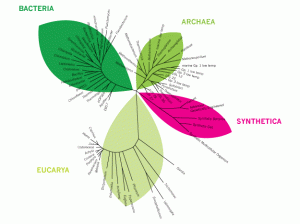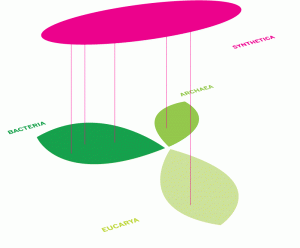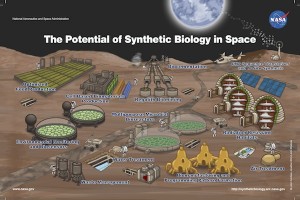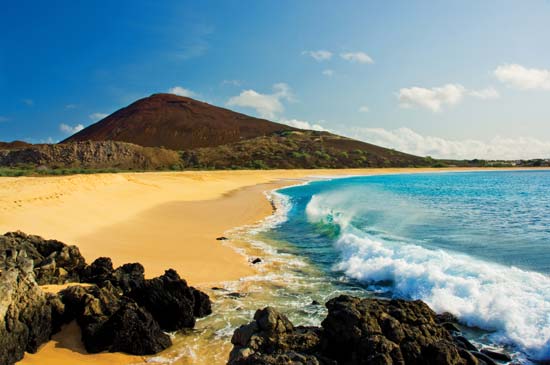From Biology to Technology
Synbio Consulting's Blog
Bacteria, Archaea, Eukarya… + Synthetica?
-What’s a Kingdom?-
 In biology, kingdom (Latin: regnum, pl. regna) is a taxonomic rank, which is either the highest rank or in the more recent three-domain system, the rank below domain. Kingdoms are divided into smaller groups called phyla (in zoology) or divisions in botany. The complete sequence of ranks is life, domain, kingdom, phylum, class, order, family, genus, and species. (Thanks wiki)
In biology, kingdom (Latin: regnum, pl. regna) is a taxonomic rank, which is either the highest rank or in the more recent three-domain system, the rank below domain. Kingdoms are divided into smaller groups called phyla (in zoology) or divisions in botany. The complete sequence of ranks is life, domain, kingdom, phylum, class, order, family, genus, and species. (Thanks wiki)
This classification changed a lot over time and is a good image of our understanding of what life is and how life forms are evolutionary interconnected. The clues to set those boundaries were first morphological but since the 70s genetics helped a lot our understanding.
The current classification from Carl Woese from the 90s uses a lot of these genetic clues, notably from the RNA 16s and is a representation of how species are linked together through evolution.
-Synthetica?-
 Arguably, I would say “Synthetica” is not a new kingdom but a separate and distinct entity.
Arguably, I would say “Synthetica” is not a new kingdom but a separate and distinct entity.
There is no evolutionary link in between those life forms and the only shared thing is the fact that they were rationally engineered.
In this vision, we would need to add a new dimension to the tree of life as Synthetica is not linked to the other kingdom through evolution but through a rational choice: “I am going to do directed evolution on this bug because it is already able to eat oil and I want to evolve the “best” bacteria to clean oil spills” or “we would like a yeast able to produce drug X, the pathway does not exist in nature but if I pick gene a from this archea and gene b from this bacteria it will work”.
Then the branches linking these life forms could reflect what kind of engineering was used, e.g. metabolic engineering, directed evolution… And the branches linked to the kingdoms what were borrowed from them.
In this sense I do prefer to think of “Synthetica” not as a “Kingdom” but as an “Ingdom”. Ing as in Ingenuity / ingenuous from the latin Ingenium (Smartness, natural capacity).
What’s a bacteria with genes from the Archea and/or the Eucarya kingdom?
How should we classify life made from scratch? (We are not there yet but lots of people are working on it)
What’s our new relationship to life?
What’s your relationship to life?
More:
- Wikipedia: Three Domain Classification
- Alexandra Daisy Ginsberg’s blog and article on the Synthetica Kingdom
Terraforming, Darwin & Synthetic Biology.
Ascension Island and the first and only terraforming experiment
At the end of his 5 year mission exploring new worlds and studying their fauna and flora, Darwin stopped at Ascension Island. A small volcanic island 1600km from Africa and 2250km off the coast of South America.
At the time it was just a big rock, bright red volcanic cones and rugged black lava. Not much else… until Darwin, his botanist friend Hooker and the Royal Navy came up with the idea of transforming it into a green Oasis.
The idea was simple yet elaborate. Lets ship trees from all over the world and put them on top of the highest peak. They will collect mist and enable other things to grow.
And you know what? It worked! Ascension is now the strangest island where an artificial ecosystem was implanted with trees and plants that did not evolve to live together.
You can read more about this crazy story on the BBC website.
Terraforming & Synthetic Biology
 The first step of terraforming, is called ecopoiesis and consists in using microbial life to change a candidate planet’s atmosphere chemistry, to enrich it in 02 and N2, as well as warming it up through green house gases if necessary.
The first step of terraforming, is called ecopoiesis and consists in using microbial life to change a candidate planet’s atmosphere chemistry, to enrich it in 02 and N2, as well as warming it up through green house gases if necessary.
Synthetic Biology could bring a lot by stepping out of its comfort zone and start developing tools to engineer “unusual” chassis. A number of extremophiles could be interesting candidate for ecopoiesis, including the Cyanobacterium Chroococcidiopsis, Thiobacillus Ferrooxidans, or Deinococcus Radiodurans which all show a variety of interesting metabolisms and properties ranging from dessication to ionizing resistance.
Will Synthetic Biology help? Most likely. In the context of space exploration, Synthetic Biology has already caught the eyes of NASA Ames which is now actively doing research in the field: “Synthetic biology in space represents a new challenge, the challenge of designing organisms to perform reliable functions that an astronaut may one day depend on”.
Ready to write a grant application? ![]()
Read more:


